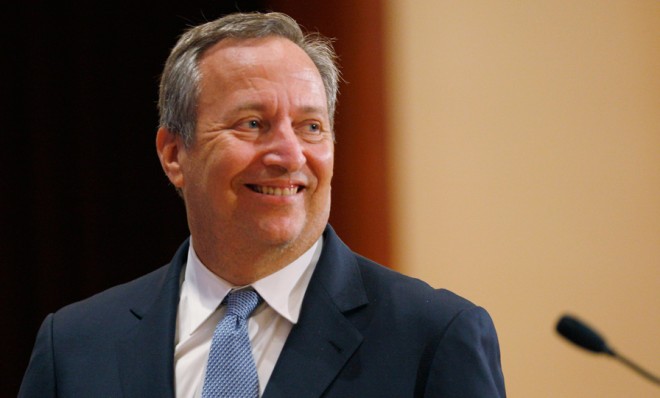Why does Obama like Larry Summers so much?
Obama appears to have all but made up his mind to nominate Summers to lead the Federal Reserve

A free daily email with the biggest news stories of the day – and the best features from TheWeek.com
You are now subscribed
Your newsletter sign-up was successful
Last week, a member of President Obama's staff told CNBC that although Larry Summers is "still being vetted," Obama will likely appoint him as chairman of the Federal Reserve to replace Ben Bernanke, whose term ends in January.
It wasn't a stand-alone leak: Several Fed officials anonymously told Reuters that they think Obama is clearly leaning toward Summers, who was the president's top economic adviser in the first two years of his term.
Speculation about a Summers appointment has grown to the point that markets are already acting as if he were the nominee. "A wide range of analysts" see a recent rise in interest rates as "evidence of a Summers effect," says Binyamin Appelbaum at The New York Times, a response to the perception that Summers is more likely to rein in the central bank's lax monetary policies.
The Week
Escape your echo chamber. Get the facts behind the news, plus analysis from multiple perspectives.

Sign up for The Week's Free Newsletters
From our morning news briefing to a weekly Good News Newsletter, get the best of The Week delivered directly to your inbox.
From our morning news briefing to a weekly Good News Newsletter, get the best of The Week delivered directly to your inbox.
The pendulum has swung toward Summers just as support for Janet Yellen, the other front-runner, seems to be on the wane, despite the fact that she is widely seen a formidable candidate. Yellen, the Fed's vice chairman, is virtually criticism-proof and, if nominated, would represent a continuation of Bernanke's policies, which for the most part have been deemed a success. Furthermore, she would be the first woman to hold the job, making her a history-making candidate.
Meanwhile, Summers' critics — which includes almost every interested observer outside the White House — continue to bring up three big points:
1. Comments he made at Harvard that many interpreted as sexist.
2. Reports that he doesn't play well with others.
A free daily email with the biggest news stories of the day – and the best features from TheWeek.com
3. And most importantly, his hand in deregulating the financial services industry as Treasury secretary under President Clinton, which critics say led directly to the financial crisis in 2008.
So why does Summers look like a shoo-in for the nomination?
It appears to come down to one factor: Obama likes him. In particular, the president is inclined to surround himself with Clinton's staff, says Ezra Klein at The Washington Post.
The Clinton administration had, by most accounts, a high-functioning economic team, and these are the people who rose highest and fastest within it. Running a White House’s economic policy is a tough and unusual job, and not that many people have experience doing it. That combination of good and qualified is rare in the world, but it happens to be common among this one group of people. [The Washington Post]
That said, Klein adds that "it stretches credulity to believe that a pure meritocratic process has simply and ineluctably led to the same six or seven people cycling among positions. Meritocracy is an element in the team’s success, but so is the fact that when it comes to his economic team, Obama doesn’t take chances."
Furthermore, Obama is surrounded in the White House by Summers' proteges. "The president's top economic advisers uniformly support the selection of Mr. Summers," says Appelbaum. "They regard him as a creative thinker and an experienced crisis manager, qualities they value in particular because they expect the Fed may confront difficult choices as it begins to retreat from its six-year-old stimulus campaign."
The relationship between Obama and Summers was also forged at the height of the Great Recession, a time of great stress that appears to have brought them closer. Zachary A. Goldfarb at The Washington Post says, "Obama developed great faith in the man who was his top economic adviser as he confronted historic crises at the beginning of his presidency."
Where others see Summers as combative, likely to cause clashes at fragile moments, Obama sees an urge to consider every option in the face of a crisis, according to longtime advisers. In a future crisis, Summers is someone who would apply the same brand of forceful intervention that was the hallmark of Obama’s own response, they said. [The Washington Post]
However, should the president tap Summers, he would likely face a grueling confirmation fight in the Senate from antagonists on both sides of the aisle. Yellen, on top of having no major drawbacks, has the advantage of a smoother path to confirmation, which could tilt the scales in her favor. As Jackie Calmes at the Times points out:
Neither Mr. Obama nor Congress can afford much time or controversy. In addition to Syria, they will be battling through the fall over two other must-act matters: financing the government by the Oct. 1 start of the fiscal year to avoid a shutdown, and increasing the nation’s borrowing limit by mid-October to maintain the nation’s creditworthiness and avert an economic crisis. [New York Times]
Carmel Lobello is the business editor at TheWeek.com. Previously, she was an editor at DeathandTaxesMag.com.
-
 6 of the world’s most accessible destinations
6 of the world’s most accessible destinationsThe Week Recommends Experience all of Berlin, Singapore and Sydney
-
 How the FCC’s ‘equal time’ rule works
How the FCC’s ‘equal time’ rule worksIn the Spotlight The law is at the heart of the Colbert-CBS conflict
-
 What is the endgame in the DHS shutdown?
What is the endgame in the DHS shutdown?Today’s Big Question Democrats want to rein in ICE’s immigration crackdown